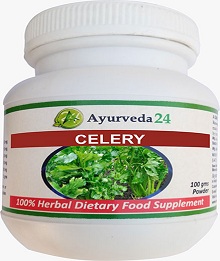Description
Botanical Name- Apium graveolens
English Name- Celery, Ajowan
Sanskrit Name – Ajamoda, Ajmoja, Ayamoda
Hindi Name – Ajmuda, Ajmod
Ajmoda is an annual or bionomical herbaciuos plant. Its leaves and the petiole are used in the form of vegetable. It is native to Mediterranean regions like Asia, Africa and Europe. In India, it is cultivated in Andhra Pradesh, Gujarat, Madhya Pradesh and Karnataka.
Celery, also known as Garden Celery is a very common Ayurvedic Medicinal Herb. Commonly called Bishop’s weed, Ajmoda is widely used in the treatment of various ailments of respiratory, digestive, circulatory and urinary system.
Classical Categorization
Charak Samhita
Shoolaprashamana – group of herbs that relieve abdominal pain
Deepaneeya- group of herbs that improve digestion strength
Sushruta and Vagbhata– Pippalyadi group of herbs
Bhavaprakasha Nighantu– Haritakyadivarga
Kaiyadeva Nighantu – Aushadivarga
Dhanvantari Nighantu– Shatapushpaadivarga
Raja Nighantu – Pipplayadivarga
Energetics of Ajmoda
According to Ayurveda
Rasa (Taste): Katu (Pungent), Tikta (Bitter)
Guna (Qualities): Laghu (Light), Ruksha (Dry), Teekshna (Piercing)
Virya (Potency): Ushna (Hot)
Vipaka (Taste conversion after digestion): Katu (Pungent)
Effect on Tridoshas : Kaphavatahara -It pacifies Vata and Kapha dosha.
Parts Used: Seeds, fruits
Chemical Constituents
Ajamoda contains: Alpha-linolenic-acid,beta-eudesmol, coumarins, flavonoids isoimperatorin, isoquercitrin, limonene, linoleic acid, p-cymene, terpinene-4-ol,3-N-butyl-phthalide,Umbelliferone Vitamin A,VitaminC,Vitamin B, volatile oils, including apiol.It contains volatile essential oil, mucilage, and salt. The essential oil contains Meethers of carvacrol, thymol, and thymoquinol, used as a carminative.
According to the World’s Healthiest Foods, celery’s phytonutrients (plant-based nutrients) include: flavones like luteolin, flavonols like quercetin, phenolic acids, and kaempferol, dihydrostilbenoids, phytosterols and furanocoumarins.
Ayurvedic Role
- Deepana – improves digestion strength
- Vidahini – may cause burning sensation
- Kaphavatajit – balances kapha and vata dosha
- Krimijit – wormicidal
- Shoolaghna – cures abdominal colic
- Balakari – improves strength
- Bastirogarujapaha – cleanses urinary bladder, relieves urinary bladder pain
- Hrudya – good for heart
- Vrushya – natural aphrodisiac
Role
- Analgesic
- Antiarthritic
- Antidiabetic
- Anti-inflammatory
- Antibacterial
- Antiviral
- Antioxidant
- Anti-rheumatic
- Antispasmodic
- Antifungal
- Anthelmintic
- Carminative
- Digestive
- Diuretic
- Diaphoretic
- Expectorant
- Intestinal Antiseptic
- Laxative
- Nervine
- Sedative
- Stimulant
- Tonic
Benefits
Digestion
Ajmoda is rich in dietary fiber. It helps keep bowel movements regular, thereby reducing constipation. It also helps curb cravings because it absorbs water in the digestive tract, making you feel fuller longer. Adding more fiber to the diet is very beneficial for weight maintenance. It burns ‘ama’ and builds up the digestive fire of agni.
It gives relief in abdominal colic, cramps, indigestion, bloating, flatulence, heartburn and intestinal parasites. It promotes downward flow of air (anulomana gati).
Some studies suggest that the antioxidants in celery could help improve stomach lining and reduce the risk of gastric ulcers. It could also possibly reduce the risk of gastritis because it stops the growth of unwanted gut bacteria that causes inflammation. It is one of the best herbs for digestive system.
Respiratory System
It shows beneficial effects on asthma, cough, cold, congestion and bronchitis. It acts as an expectorant, thus helps to get rid of the excess mucous. It also dilates lungs pathway by preventing spasm.
Heart Care
Ajmoda may help reduce blood pressure but there is no strong evidence. It may also reduce levels of low-density lipoprotein (LDL) or “bad” cholesterol, triglycerides and increase HDL (good cholesterol).
Celery’s fiber may help reduce cholesterol levels as it picks up excess cholesterol molecules from gut and eliminates it. It also purifies blood.
It also contains compounds that relax the muscles surrounding the arteries, allowing blood vessels to dilate. This helps improve circulation, reduces lymphatic stagnation, and aids detoxification.
Nervous System
Ajmoda may stimulate neurogenesis, the growth and development of nerve cells. It also removes nervous constriction.
Rheumatism
Ajmoda is anti-inflammatory and anti-rheumatic. It is a chief component of Ayurvedic medicines used in the treatment of Arthritis, Rheumatoid Arthritis, Gout. It is useful in nerve inflammation. It helps renew joints, bones, arteries, and all connective tissues.
It is widely recommended in Joint pain in arthritis such as osteoarthritis, rheumatoid arthritis, gouty arthritis, and non-specific arthritis.
Cancer
There is limited research in this field but the antioxidants, flavonoids and phytonutrients present in Ajmoda are sometimes associated with reduced cancer risk. In many studies it is found to be protective in pancreatic cancer. It may have properties that help combat cancer.
According to some studies, ‘apigenin’ present in Ajmoda may contribute to apoptosis (a kind of programmed cell death), which may help in cancer treatment.
As per certain research studies, a flavonoid called ‘luteolin’ present in Ajmoda may have anticancer properties. It may help prevent the spread of cancer cells and induce cell death.
Other Uses
- Ajmoda is beneficial in treating liver diseases including jaundice.
- It is used in Urinary disorders, burning urine, urinary tract obstruction.
- Helpful in psoriasis, acneand other skin disorders.
- It gives relief in menstrual cramps and promotes menstruation.
- It can be used in eye inflammations.
Why Ayurveda24 Celery (Ajmoda)?
Available with powder of Ajmoda(celery)-best herb for digestive system
MORE POTENT
Organic product
Less dosage – 2 grams a day will be sufficient.
We will soon witness the day where Modern Medicine and Herbs (opposite fields of medicine) will work together for the Treatment and Benefit of the human.
CALL US FOR FREE CONSULTATION
WE PUT LIFE INTO LIFE

